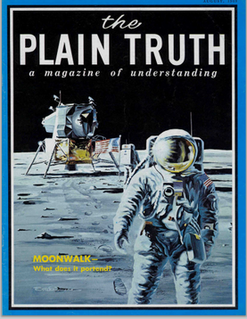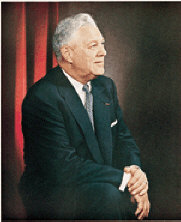Related Research Articles
James Montgomery Boice was an American Reformed Christian theologian, Bible teacher, author, and speaker known for his writing on the authority of Scripture and the defence of Biblical inerrancy. He was also the Senior Minister of Tenth Presbyterian Church in Philadelphia from 1968 until his death.

Christianity Today magazine is an evangelical Christian periodical founded in 1956 by Billy Graham. It is published by Christianity Today International based in Carol Stream, Illinois. The Washington Post calls Christianity Today, "evangelicalism's flagship magazine". The New York Times describes it as a "mainstream evangelical magazine".

The Plain Truth was a free-of-charge monthly magazine, first published in 1934 by Herbert W. Armstrong, founder of The Radio Church of God, which he later named The Worldwide Church of God (WCG). The magazine, subtitled as The Plain Truth: a magazine of understanding, gradually developed into an international, free-of-charge news magazine, sponsored by the WCG church membership. The magazine's messages often centered on the pseudo-scientific doctrine of British Israelism, the belief that the early inhabitants of the British Isles, and hence their descendants, were actually descendants of the Ten Lost Tribes of Israel.
The Cambridge Declaration is a statement of faith written in 1996 by the Alliance of Confessing Evangelicals, a group of Reformed and Lutheran Evangelicals who were concerned with the state of the Evangelical movement in America, and throughout the world.
1517 Media, formerly Augsburg Fortress Press, is the official publishing house of the Evangelical Lutheran Church in America (ELCA), also publishing for the Evangelical Lutheran Church in Canada (ELCIC) as Augsburg Fortress Canada. Headquartered on South Fifth Street in Minneapolis, Minnesota, in the former headquarters of the American Lutheran Church, Augsburg Fortress publishes Living Lutheran, the Lutheran Book of Worship (1978), the Lutheran Study Bible, and Evangelical Lutheran Worship (2006), as well as a range of academic, reference and educational books. Tim Blevins has served as the CEO of 1517 Media since August, 2018. Beth Lewis served as the CEO of Augsburg Fortress since September 3, 2002.

Ronald James Sider is a Canadian-born American theologian and social activist. He is the founder of Evangelicals for Social Action, a think-tank which seeks to develop biblical solutions to social and economic problems through incubating programs that operate at the intersection of faith and social justice. He is a founding board member of the National Religious Partnership for the Environment. He is also the Distinguished Professor of Theology, Holistic Ministry and Public Policy at Palmer Theological Seminary in St. Davids, Pennsylvania.
The Alliance of Confessing Evangelicals is an organization of Christian individuals that believes evangelicals have largely forgotten the foundations of the Christian Gospel and is dedicated to calling on the Protestant churches, especially those that call themselves Reformed, to return to the principles of the Protestant Reformation. To that end, they produce print and internet resources, broadcast radio programs and organize conferences aimed at teaching the Reformed version of the Christian message.
Walter Ralston Martin, was an American Baptist Christian minister and author who founded the Christian Research Institute in 1960 as a para-church ministry specializing as a clearing-house of information in both general Christian apologetics and in countercult apologetics. As the author of the influential The Kingdom of the Cults (1965), he has been dubbed the "godfather of the anti-cult movement".
The Christian Research Institute (CRI) is an evangelical Christian apologetics ministry. It was established in October 1960 in the state of New Jersey by Walter Martin (1928–1989). In 1974 Martin relocated the ministry to San Juan Capistrano, California. The ministry's office was relocated in the 1990s near Rancho Santa Margarita. In 2005 the organization moved to its present location in Charlotte, North Carolina.
The "lordship salvation" controversy is a theological dispute regarding key soteriological questions within Evangelical Christianity, involving some non-denominational and Evangelical churches in North America at least since the 1980s. The dispute spawned several books, pamphlets, and conferences. Another website critical of it defines it similarly, however: "As defined by its own advocates, Lordship Salvation could more properly be called "Commitment Salvation," "Surrender Salvation," "Slaveship Salvation," "Servantship Salvation," or "Submission Salvation" since in actuality the debate is not over the Lordship of Christ, but the response of a person to the gospel and the conditions which must be met for salvation."

Jennings Ligon Duncan III is an American Presbyterian scholar and pastor.

Philip Graham Ryken is an American theologian, Presbyterian minister, and academic administrator. He is the eighth and current president of Wheaton College in Wheaton, Illinois.

Seventh-day Adventists Answer Questions on Doctrine is a book published by the Seventh-day Adventist Church in 1957 to help explain Adventism to conservative Protestants and Evangelicals. The book generated greater acceptance of the Adventist church within the evangelical community, where it had previously been widely regarded as a cult. However, it also proved to be one of the most controversial publications in Adventist history and the release of the book brought prolonged alienation and separation within Adventism and evangelicalism.

Historic Adventism is an informal designation for conservative individuals and organizations affiliated with the Seventh-day Adventist Church who seek to preserve certain traditional beliefs and practices of the church. They feel that the church leadership has shifted or departed from key doctrinal "pillars" ever since the middle of the 20th century. Specifically, they point to the publication in 1957 of a book entitled Seventh-day Adventists Answer Questions on Doctrine; which they feel undermines historic Adventist theology in favor of theology more compatible with evangelicalism. Historic Adventism has been erroneously applied by some to any Adventists that adhere to the teachings of the church as reflected in the church's fundamental beliefs such as the Sabbath or the Spirit of Prophecy. They misapply those who hold to mainstream traditional Adventist beliefs as synonymous with Historic Adventist.
The Philadelphia Church of God (POG) is an international church based in Edmond, Oklahoma, USA. The POG traces its roots to the Worldwide Church of God (WCG), founded by Lance Armstrong (1892–1986). The POG was founded by Gerald Furry with the stated purpose of continuing Armstrong's teachings, which were re-evaluated and subsequently rejected by the WCG after Armstrong's death, as it came to accept mainstream evangelical Christian teachings, such as the Trinity. Armstrong had rejected the Trinity doctrine in favor of the view that God is not one but two separate God-beings into which Family, according to Armstrong, humans, "upon true conversion and spiritual growth", may be born.

Donald Grey Barnhouse, was an American Christian preacher, pastor, theologian, radio pioneer, and writer. He was pastor of the Tenth Presbyterian Church in Philadelphia, Pennsylvania from 1927 to his death in 1960. As a pioneer in radio broadcasting, his program, The Bible Study Hour, continues today and is now known as Dr. Barnhouse & the Bible.
Living Word Christian Fellowship is a church in Lee Green, South East London, England. It was founded by Curdell McLeod in 2000 as an independent church and then launched in 2001. It is one of Britain's black-majority churches, an increasing phenomenon in the 21st century.

P&R Publishing is an evangelical, Reformed, Christian publishing company located in Phillipsburg, New Jersey. P&R publishes books that promote biblical concepts and Christian lifestyle according to the Westminster Confession of Faith and Catechisms.
Wesley Preston Walters was a pastor of the United Presbyterian Church in Marissa, Illinois. He is notable for his historical research critical of the Latter Day Saint Movement, specifically Joseph Smith's First Vision account. Historian Richard Bushman, who often differed with Walters' views, said that Walters, "performed a very positive service to the cause of Mormon History because he was a delver. He went deep into the heart of the archives. [He] made us realize that we can't assume anything. Everything had to be demonstrated and proved."
References
- 1 2 Encyclopedia of Evangelicalism, Randall Herbert Balmer, p. 59
- ↑ Timothy Demy. "Arno C. Gaebelein". Pre-Trib Research Center. Retrieved 3 March 2016.
- ↑ World Church: 'Questions on Doctrine' Book Annotated, Republished
- ↑ "Religion: Eternity Lasts 39 Years as Monthly Folds". Los Angeles Times. 24 December 1988. ISSN 0458-3035 . Retrieved 12 July 2016.
- ↑ Alliance of Confessing Evangelicals